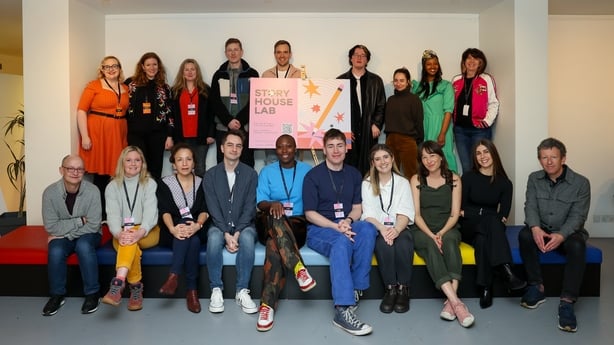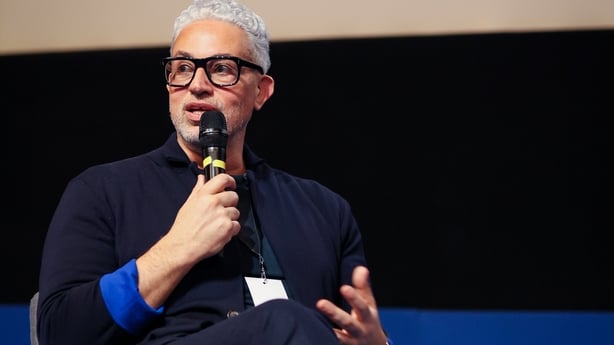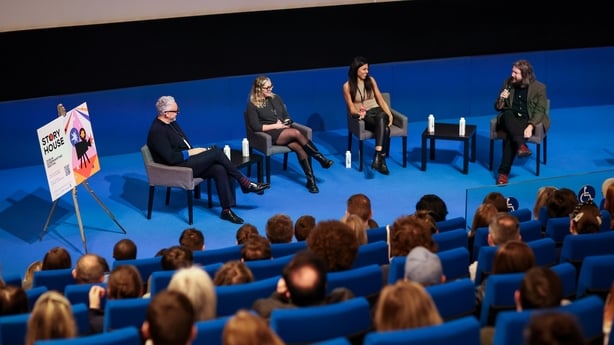Last month, the first ever Storyhouse Screenwriting Festival took place in Dublin's beautiful Light House Cinema – two days of interviews, panels and conversations with the best of Irish and international screenwriting talent.
Tickets flew out the door in mere seconds and 277 screenwriters filled the Light House's Screen 1 to hear from such internationally beloved screenwriters such as Tony McNamara (Poor Things, The Favourite, The Great), David Nicholls (One Day), Nancy Harris (The Dry), Sarah Phelps (Dubin Murders, The Sixth Commandment) and many more discuss their craft and the day-to-day trials and tribulations of being a professional screenwriter.
Storyhouse programmer Charlene Lydon talks about some of her main takeaways from the event.
Ideas are infinite…because voices are unique
After two days of listening to screenwriters from all backgrounds, with all kinds of careers and creative styles, it’s obvious that your most valuable asset as a writer is your own voice. Whether you’re writing a completely original work or working on a show created by someone else, having confidence in what you want to say and how to say it is one of the best gifts you can have as a writer.
Your background, your professional life, your family and friends – all of these things inform who you are and what your authorial voice will be. Listening to people from all walks of life speak about their journey is a great reminder that "diverse" is not a buzzword, it’s a necessity. Entertainment and art is so much better for having been created from a range of different perspectives.

alongside participants of the Storyhouse Lab
You learn from everything
The craft of writing takes a lifetime to finesse and while you’re on that journey you need to earn a living. Sometimes you need to work on something that might not be to your taste in order to fund that dream project that’s almost within your grasp. There’s learning to be found everywhere.
If you’re not a comedy person, it’s still valuable to learn about the craft of forming jokes; if you hate soaps, there’s still a huge amount to learn from them about teamwork, working to tight deadlines and the chaos of production; if you’re not an arthouse film lover, working to strict budgets and learning how to engage an audience with challenging material is still worthwhile. Work everywhere and love the work. Doing a good job is never a waste of time!
Your background, your professional life, your family and friends – all of these things inform who you are and what your authorial voice will be.
You have to love the work
Screenwriting is hard. You produce draft after draft and often your script may never see the light of day. Any writer will tell you that you need to have several scripts on the boil at any given time in the hope that one of them will actually happen. But you love it! You take the ups and downs as they come because you love the work and you know that for every insanely busy period, there’s a quiet period around the corner where you’ll be wishing you were busy again. Welcome to the world of self-employment.

There is so much to talk about
Over two days, seven panels with eighteen writers speaking and moderating, I was really struck by the broad range of engaging conversations you can have on the topic of screenwriting. Everyone has different experiences, different taste, different creative desires – it’s fascinating to immerse yourself in one topic for two days and remain completely enthralled throughout. From an intricate case study of The Dry to full career retrospectives and debut filmmakers talking about the experience of having no experience – there’s so much to discuss and very little crossover within the conversations.
Find your people!
Probably the most important point I took away from listening to all these brilliant and successful screenwriters was that you need to surround yourself with good people, who you can place your trust in, people who trust that you can deliver what they’re asking for. In some ways, writing is quite solitary but you’ll always have to work with collaborators such as development executives, producers, directors, agents in order to make your words reach the screen.

(True Detective), and moderator Patrick Freyne speaking at Storyhouse
The conversations you’ll be part of aren’t always easy, but if you can trust that people you work with have the best intentions for your work and that they have excellent taste, the collaboration will be fruitful. For the good of the work, for the good for your mental health and for the good of career development – put your trust in people and hone your instincts to finding the right collaborators.
Find out more about the Storyhouse Screenwriting Festival here.

